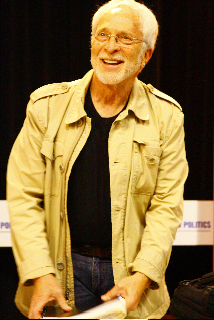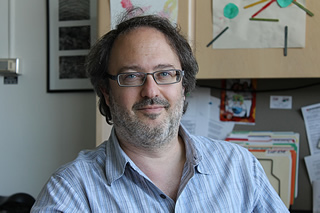PRINCIPAL INVESTIGATORS
 Robotics, organ transplantation, end of life stories—and creative nonfiction.
Robotics, organ transplantation, end of life stories—and creative nonfiction.
Lee Gutkind, recognized by Vanity Fair as “the Godfather behind creative nonfiction,” is the author and editor of more than 25 books and founder and editor of Creative Nonfiction, the first and largest literary magazine to publish narrative nonfiction exclusively. He is Distinguished Writer-in-Residence in the Consortium for Science, Policy & Outcomes at Arizona State University and a professor in the Hugh Downs School of Human Communication
Gutkind has lectured to audiences around the world—from China to the Czech Republic, from Australia to Africa to Egypt. He has appeared on many national radio and televisions shows, including The Daily Show with Jon Stewart (Comedy Central), Good Morning America, National Public Radio’s Talk of the Nation and All Things Considered, as well as BBC World.
Gutkind is the recipient of grants and awards from many different organizations, from the National Endowment for the Arts to the National Science Foundation.
A prolific author, his most recent books include An Immense New Power to Heal: The Promise of Personalized Medicine and an anthology, At the End of Life: True Stories About How We Die.
His new book: You Can’t Make This Stuff UP, is described by Susan Orlean, author of The Orchid Thief and Rin Tin Tin, as the “essential and definitive guide to creative nonfiction . . . engaging, useful, indispensable and inspiring.”
For more information see: www.leegutkind.com or www.creativenonfiction.org
 David H. Guston is Professor of Politics and Global Studies and Co-Director of the Consortium for Science, Policy and Outcomes at Arizona State University. He is also the Principal Investigator and Director of the Center for Nanotechnology in Society at ASU. CNS-ASU, funded by the National Science Foundation for roughly $13 million over ten years (2005-2015), is dedicated to studying the societal implications of nano-scale science and engineering research and improving the societal outcomes of nanotechnologies through enhancing the societal capacity to understand and make informed choices. His book, Between Politics and Science (Cambridge U. Press, 2000) was awarded the 2002 Don K. Price Prize by the American Political Science Association for best book in science and technology policy, and his papers are among the most well-cited in the field. His narrative article, “The Pumpkin or the Tiger: Michael Polanyi, Frederick Soddy, and Anticipating Emerging Technologies” is forthcoming in Minerva. Professor Guston has held visiting positions at Columbia University, the Copenhagen Business School, the Kent School of Law, and Durham University in the United Kingdom. In 2002, he was elected a fellow of the American Association for the Advancement of Science. In 2008, he served as co-chair of the Gordon Research Conference on Science and Technology Policy, “Governing Emerging Technologies.” He holds an A.B. from Yale College and a PhD in political science from MIT.
David H. Guston is Professor of Politics and Global Studies and Co-Director of the Consortium for Science, Policy and Outcomes at Arizona State University. He is also the Principal Investigator and Director of the Center for Nanotechnology in Society at ASU. CNS-ASU, funded by the National Science Foundation for roughly $13 million over ten years (2005-2015), is dedicated to studying the societal implications of nano-scale science and engineering research and improving the societal outcomes of nanotechnologies through enhancing the societal capacity to understand and make informed choices. His book, Between Politics and Science (Cambridge U. Press, 2000) was awarded the 2002 Don K. Price Prize by the American Political Science Association for best book in science and technology policy, and his papers are among the most well-cited in the field. His narrative article, “The Pumpkin or the Tiger: Michael Polanyi, Frederick Soddy, and Anticipating Emerging Technologies” is forthcoming in Minerva. Professor Guston has held visiting positions at Columbia University, the Copenhagen Business School, the Kent School of Law, and Durham University in the United Kingdom. In 2002, he was elected a fellow of the American Association for the Advancement of Science. In 2008, he served as co-chair of the Gordon Research Conference on Science and Technology Policy, “Governing Emerging Technologies.” He holds an A.B. from Yale College and a PhD in political science from MIT.